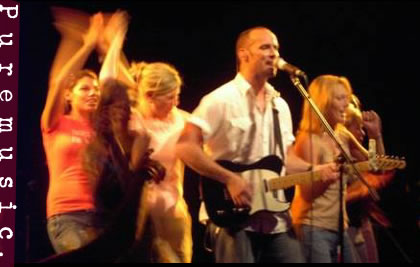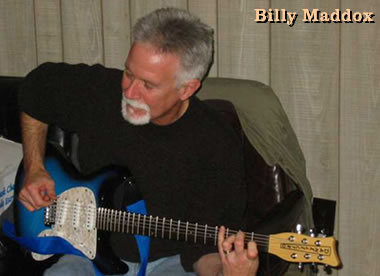
A Conversation with Paul Thorn (continued)
PM: Now, those great songs over the course of the three records that I've heard, and I'm sure all the others, a lot of them seem to have been written with Billy Maddox.
PT: That's true.
PM: So let's talk about him and your relationship with him, and your songwriting process, and all that stuff.
PT: Well, that's always something I enjoy talking about. Billy is my songwriting mentor, above all others. When I was about 17 in high school, my cousin, who was a keyboard player in Parliament Funkadelic, came to our family Christmas.
PM: Wow.
PT: And at the time I was, like I said, 17, and I just sat in my bedroom and wrote some corny love songs for girls at school--just typical teenage subjects. Anyway, I played them for my cousin's family. And he could tell that my songwriting wasn't there, but he also could tell that I had something that maybe was a little special. So he knew Billy Maddox. And at the time, Billy was having some success as a country songwriter. Billy had just written a big song for Hank Williams, Jr., called "If Heaven Ain't a Lot Like Dixie, I Don't Want to Go." You heard that?
PM: Sure.
PT: Yeah. And he wrote a bunch of songs for T. Graham Brown, and he had a string of successes going on. Well, anyway, Stanley came and took me over there to his studio and introduced me to him at the age of 17. And Billy also heard that I had something that just needed to steer me in the right direction and show me how to put a song together. So I'm 41 years old, to make a long story short, and Billy and I have been writing together since I was 17.
PM: Wow.
PT: And if you look on our albums, it says the producers are Sweet T and Black Eyed Pea, International Record Producers of the Entire World. Well, anyway, that's me and Billy, are Sweet T and Black Eyed Pea.
PM: [laughs] I knew it was you two guys!
PT: But anyway, so Billy is my songwriter mentor, he's my business partner, and he and I own our own record company together. And every single year since we've been doing this full time, which is like since '97, our following and everything we do has grown every single year. And Billy is just like an angel from heaven, man, because he really spent some time with me and shared what somebody had given him about songwriting. And now I've got that knowledge, and I'm able to put my own spin on it. And Billy and I, we just collaborate so well because we've been doing it so long. We're on the road. We did 175 shows this year.
PM: So does he go on the road with you?
PT: Yeah. We go everywhere. We go everywhere.
PM: Wow. And does he kind of--because I noticed that when you try to get in contact with Paul Thorn, it's Billy that you're writing to. I said, "What an interesting thing, he's the co-writer, I think he's the co-producer..."

PT: Yep.
PM: "And he's also the guy that will handle a letter when it's coming in. It's like he's everywhere in this organization."
PT: That's right. I'm telling you, Billy is--there's no amount of money that you could give me to ever do anything against Billy. He is gold. He's the angel, man. And he and I--well, see, he and I complement one another because we're each strong where the other may be weaker. And Billy is just the best, man. I could go on and on about him.
PM: So if you're 41, he's fifty-something.
PT: He's 51 or 52, or something like that, yeah.
PM: So when you met him, he'd already had some country hits.
PT: Yeah.
PM: Did he give up writing those kinds of songs?
PT: Yeah, he did. Actually, he did. I mean, Billy has had songs recorded by other artists--we've had a lot of songs recorded by other artists. But we're not really pursuing it. The way it's happened is these artists just accidentally get my CDs, and they want to cut our songs.
PM: Wow.
PT: Because I've never pursued being a songwriter for other people. It's just happened accidentally.
PM: Well, jeez, all you guys need--you write classic songs, all you need is a song plugger in Nashville to plug some songs. You don't got to pursue it, just give them the catalog.
PT: Well, yeah, I've had a lot of cuts. Mostly in the country genre because, like I said, I don't pursue it, and it seems at this point those are the only people that are familiar with me. I've had cuts on Toby Keith, I've had cuts on--
PM: Really?
PT: Yeah. I had a cut on Toby Keith, a cut on a Sawyer Brown. I had a cut on Jerry Jeff Walker. I had a cut on Ronnie Milsap. I had a cut on--gosh I can't remember. I had about five or six cuts on Sawyer Brown.
PM: Oh, really?
PT: I've had a cut on Tanya Tucker.
PM: So some of those had to be pretty serious mailbox money, right? I mean, the Sawyer Brown and the Toby Keith cuts?
PT: Not really, strangely. I mean, it's doing okay. But even though those are big names, a lot of those cuts--like the Sawyer Brown, for instance, although I've had a lot of cuts on them, I've had cuts on them after they'd had their big heyday.
PM: Right. It wasn't on the right record.
PT: It wasn't the right time. I've had cuts on Billy Ray Cyrus--I've had a bunch of cuts. I'll just use Billy Ray Cyrus as an example. He cut my song "Burn Down the Trailer Park." And yeah, that's great, but the reality of it is, when it came out, radio wouldn't touch Billy Ray Cyrus with a ten-foot pole.
PM: He was done.
PT: He was done, exactly. That's the bad thing about mainstream music, too, is the following you get when you're mainstream, it's not really a loyal following.
PM: It's the most fickle.
PT: It's the most fickle. If you're hot, and if you're not TV, they love you. And then they forget real quick.
PM: Yeah.
PT: And in the world that I dwell in, which is the underground, it seems like you never get that massive--you don't get your picture on a cereal box or anything--but the people that you get, they stay with you for life. I've noticed that. Because somebody I really look up to--not just his music, but just his whole career--is John Prine--
PM: Oh, yeah.
PT: --because John doesn't have any hits. And you can put his name on just about any building in any major city, and there's a big old crowd of people that are going to come.
PM: That's a very good example. continue
print (pdf) listen to clips puremusic home